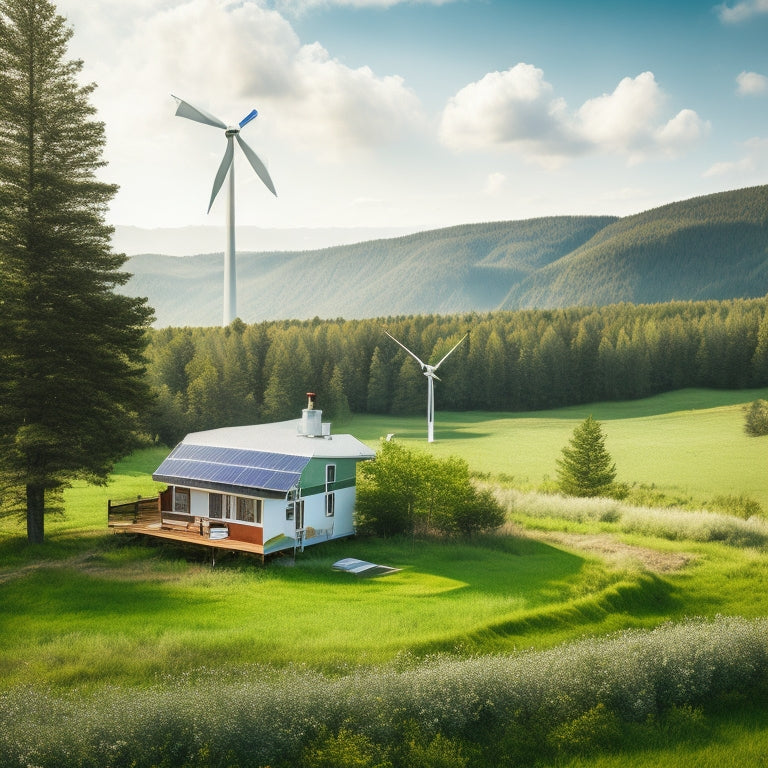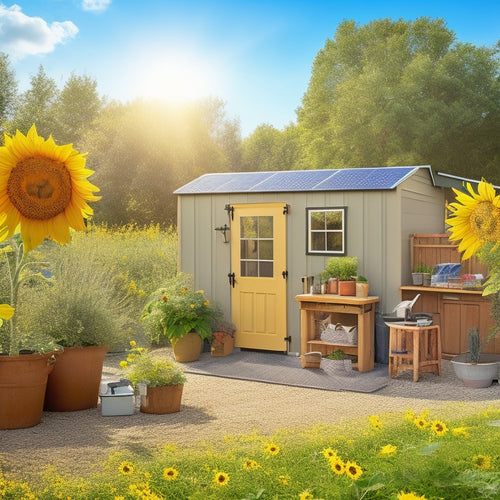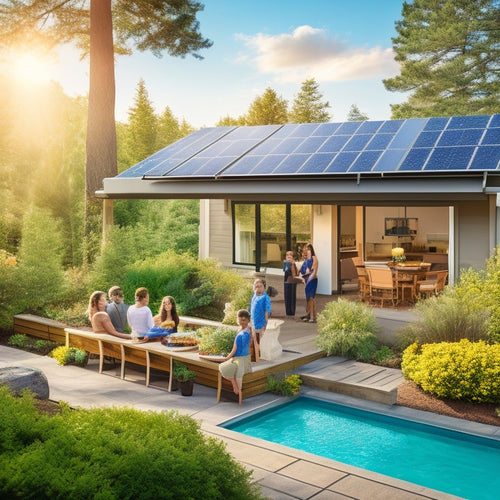
Remote Area Solutions: Renewable Energy Essentials Online
Share
You're about to open the door to a world of renewable energy essentials online, where decentralized power solutions, off-grid energy products, and expert consultation converge to empower remote areas with sustainable energy independence. Access online tutorials, webinars, and courses to develop energy literacy and green skills. Explore decentralized power solutions that guarantee power reliability and energy independence. Evaluate local energy demand and renewable resources, considering solar, wind, and hydro power options. As you explore further, you'll discover more about system design, installation techniques, and the benefits of online shopping for remote area renewable energy solutions.
Key Takeaways
• Develop energy literacy and gain hands-on experience with virtual labs and online courses to understand renewable energy essentials.
• Evaluate local energy demand and renewable resources to design and install decentralized power solutions for remote areas.
• Choose from a wide range of online products, including solar panels, wind turbines, and energy storage systems, for remote area renewable energy solutions.
• Consult with experts online for informed purchases, system design, and troubleshooting support to ensure optimal energy production and reduced carbon footprint.
• Compare prices online to find cost-effective solutions, deals, and discounts on renewable energy products, and avoid markup costs from local retailers.
Online Renewable Energy Essentials
You can access online resources that provide fundamental knowledge on renewable energy systems, including tutorials, webinars, and online courses that cover the basics of solar, wind, and hydro power.
These resources are perfect for developing your energy literacy and acquiring essential green skills. You'll learn about the principles of renewable energy, system design, and installation techniques.
Online courses often include interactive simulations, quizzes, and assignments to help you grasp complex concepts. You'll gain hands-on experience with virtual labs and case studies, making you proficient in renewable energy technologies.
By leveraging these online resources, you'll be well-equipped to design, install, and maintain renewable energy systems. With your newfound knowledge, you can contribute to the shift towards a sustainable energy future.
Take the first step towards becoming a renewable energy expert and start exploring these online resources today.
Remote Area Power Solutions
In remote areas where traditional grid connectivity is unreliable or non-existent, decentralized power solutions are essential for providing energy access to off-grid communities. You need reliable power to support daily life, economic development, and social progress. Remote area power solutions offer a vital alternative to traditional grid-based systems, ensuring power reliability and energy independence.
When designing a remote infrastructure, it's essential to take into account the unique challenges of off-grid locations. You'll need to evaluate the local energy demand, available renewable energy resources, and the feasibility of different power generation technologies. By doing so, you can create a tailored power solution that meets the specific needs of the community.
Solar, wind, and hydro power are popular options for remote area power solutions, as they're often abundant and can be harnessed locally. Energy storage systems, like batteries, can also play a critical role in ensuring power reliability and stabilizing the grid.
Off-Grid Energy Product Reviews
Selecting the right off-grid energy products is vital to ensuring reliable power generation and energy independence in remote areas. That's why it's important to scrutinize product reviews from experts and users who've hands-on experience with these systems.
When choosing off-grid energy products, you want to make sure they're reliable, efficient, and suitable for your specific needs. Here are some key factors to keep in mind:
-
Energy Storage: Look for products with advanced energy storage capabilities, such as lithium-ion batteries, to guarantee a stable power supply.
-
Product Reliability: Evaluate the product's durability, weather resistance, and ability to withstand harsh environmental conditions.
-
Real-World Performance: Check reviews from users who've installed and used the products in real-world scenarios to get a sense of their performance and any potential issues.
Solar Panel Systems for Homes
Frequently, homeowners seeking energy independence turn to solar panel systems, which have become increasingly efficient and affordable, making them a viable option for powering homes.
As you consider investing in a solar panel system, it's important to understand the benefits and requirements. You'll want to assess your energy needs, taking into account your home's energy efficiency and potential energy-saving upgrades.
When selecting a solar panel system, look for high-efficiency panels with a high wattage output. Additionally, consider the system's durability and warranty offered by the manufacturer.
Solar maintenance is vital to ensure maximum energy production; you'll need to clean the panels regularly and monitor the system's performance. By doing so, you'll maximize your energy yield and reduce your reliance on the grid.
With a well-designed and properly installed solar panel system, you can enjoy significant energy savings and a reduced carbon footprint. By harnessing the power of the sun, you'll be taking a significant step towards energy independence.
Renewable Energy for Rural Areas
As you explore renewable energy solutions for rural areas, you'll encounter the significant energy access challenges that these communities face.
You'll find that off-grid power solutions can effectively address these challenges, providing reliable energy to rural areas that are often disconnected from the main grid.
Energy Access Challenges
Rural communities often face significant energy access challenges, including limited grid connectivity and high transportation costs, which hinder the delivery of essential services and economic opportunities.
You're likely familiar with the struggles of energy poverty, where lack of access to reliable energy sources limits your ability to participate in economic activities, access basic services, and improve your overall quality of life.
Rural isolation only exacerbates these challenges, making it difficult to reach remote areas and provide them with the energy they need.
Here are three key energy access challenges you're likely to face:
-
Limited infrastructure: In many rural areas, the electrical grid is either non-existent or unreliable, making it difficult to access energy.
-
High energy costs: The cost of transporting fuel to remote areas can be prohibitively high, making energy unaffordable for many rural communities.
-
Lack of energy access data: In many cases, there's a lack of data on energy access in rural areas, making it difficult to identify areas that need the most support.
Off-Grid Power Solutions
You can power rural areas with off-grid renewable energy solutions, effectively bypassing the need for grid connectivity and high-cost fuel transportation. This approach is particularly suitable for remote locations such as wilderness retreats and island communities, where traditional energy infrastructure is often lacking.
Off-grid power solutions offer a reliable and sustainable way to provide energy access to these areas. By harnessing renewable energy sources like solar, wind, and hydro power, you can generate electricity independently of the grid.
Here are some key benefits of off-grid power solutions:
| Benefit | Description |
|---|---|
| Energy Independence | No reliance on grid connectivity or fuel transportation |
| Sustainability | Renewable energy sources reduce carbon footprint |
| Cost-Effective | Lower operating costs compared to traditional energy sources |
Rural Energy Independence
Rural Energy Independence
In regions where traditional energy infrastructure is scarce, harnessing locally available renewable energy sources can empower rural communities to take control of their energy needs. By leveraging renewable energy, you can break free from reliance on external energy providers and create a more sustainable future for your community.
Here are three ways you can achieve rural energy independence:
-
Community Engagement: Involve local residents in the planning and decision-making process to guarantee that energy solutions meet the community's unique needs and priorities.
-
Energy Cooperatives: Establish member-owned cooperatives that allow communities to collectively own and manage their renewable energy infrastructure, reducing costs and increasing energy autonomy.
-
Decentralized Energy Systems: Implement off-grid energy solutions, such as solar home systems or mini-grids, that provide reliable and sustainable energy access to rural households and businesses.
Buying Off-Grid Energy Online
With the rise of e-commerce, purchasing off-grid energy solutions online has become a convenient and efficient way to acquire essential components for your remote area setup.
You can now browse through various e-commerce platforms and digital marketplaces to find the perfect solution for your energy needs. Online retailers offer a wide range of products, from solar panels and wind turbines to inverters and energy storage systems.
You can read reviews, compare prices, and even consult with experts online to guarantee you're making an informed purchase. Additionally, online marketplaces often provide access to a global network of suppliers, allowing you to find rare or specialized components that may not be available locally.
Frequently Asked Questions
What Is the Average Lifespan of a Solar Panel System?
You can expect a solar panel system to last around 25-30 years, with proper solar panel maintenance ensuring peak energy efficiency ratings; regular inspections and cleaning help maximize its lifespan.
Can I Install Renewable Energy Systems Myself?
'Like a master builder constructing a majestic castle, you're enthusiastic to install renewable energy systems yourself, but beware, DIY safety risks lurk in every circuit. Guarantee a sturdy system design, or your castle may crumble, literally.'
How Do I Choose the Right Battery for Off-Grid Energy?
When selecting the right battery for off-grid energy, you'll want to factor in depth testing to determine its capacity, and cycle counting to gauge its lifespan, ensuring a reliable and efficient energy storage solution that meets your needs.
Are Renewable Energy Systems Eligible for Government Incentives?
You can take advantage of government incentives for renewable energy systems, including tax credits, grant funding, and policy updates, which provide significant financial benefits, helping to offset system costs and increase ROI.
Can I Use Renewable Energy to Power My Entire Home?
'You can definitely power your entire home with renewable energy, leveraging energy efficiency and home automation to optimize consumption, ensuring a seamless and sustainable shift to a zero-carbon lifestyle.'
Related Posts
-

How to Achieve a Zero-Waste Lifestyle for a Greener Tomorrow
To achieve a zero-waste lifestyle, start by adopting the principles of refusing, reducing, reusing, and recycling. Sw...
-

Building an Emergency Backup Solar Power System in 5 Essential Steps
Building an emergency backup solar power system involves five key steps. First, assess your daily energy needs to ide...
-

Top-Rated Home Solar Power Kits for Achieving Energy Independence
Top-rated home solar power kits enable you to achieve energy independence by greatly cutting your energy costs. You c...


